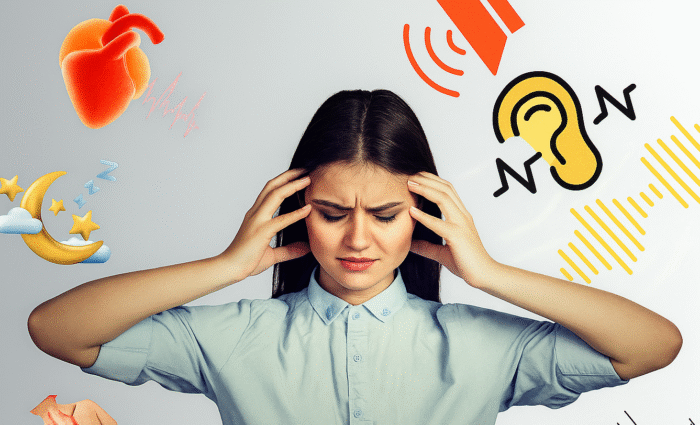When we think of hearing loss, the common causes often come to mind—aging, family history, or repeated exposure to loud environments like concerts, parties, or cheering at cricket matches. But what if the reason isn’t always external noise? What if everyday stress and anxiety, constant companions in modern life, are quietly impacting our ears too?
Surprising as it may seem, studies suggest that our mental health and hearing are more connected than we often realize. Let’s explore how stress can influence hearing—and what steps we can take to protect it.
The Link Between Stress and Hearing
Anxiety isn’t just a feeling—it’s a full-body response. When stress levels rise, the body quickly shifts into fight-or-flight mode: the heart races, blood vessels tighten, and the nervous system goes on high alert.
Here’s the problem: the inner ear, especially the sensitive cochlea, relies on a steady blood supply to function well. Stress can restrict this blood flow, leading to hearing-related issues. That’s why people under chronic stress may experience:
- Tinnitus (ringing or buzzing in the ears)
- Heightened sensitivity to everyday sounds
- Muffled hearing, as though sounds are trapped behind a layer
Can Anxiety Cause or Worsen Hearing Loss?
Anxiety itself doesn’t usually cause permanent hearing damage. However, ongoing stress can create conditions that interfere with hearing, such as:
- Reduced oxygen and nutrient supply to the ear due to limited blood flow
- Jaw clenching or neck tension affecting sound clarity
- Increased perception of tinnitus, making mild ringing seem louder
- Sleep disturbances that worsen both stress and hearing
So, while anxiety may not directly cause hearing loss, it can certainly make hearing problems worse—or make existing issues feel more overwhelming.
The Emotional Cycle of Stress and Hearing
Stress and hearing challenges often fuel each other. For example, tinnitus can trigger stress, while stress can intensify the ringing or muffling. This cycle makes the symptoms harder to manage, creating a loop of anxiety and sound sensitivity.
Managing Stress-Related Hearing Problems
The good news: managing stress can ease many hearing difficulties. A few effective approaches include:
Relaxation practices: Deep breathing, yoga, and meditation help calm the body and mind.
Professional support: Counseling or therapy can reduce anxiety and improve emotional balance.
Hearing evaluations & aids: If you notice ringing, muffling, or sudden changes, schedule a hearing test at Times Health Care—the leading hearing aid clinic in Chandigarh, Mohali, and Panchkula.
Healthy lifestyle choices: Good sleep, balanced nutrition, and reduced caffeine intake benefit both mental health and hearing.
Protecting Your Hearing with Times Health Care
Stress may not be the main cause of hearing loss, but it plays an important role in how we experience sound. Since our emotions and ears are closely linked, taking care of your mental health is just as important as caring for your hearing.
If you notice unusual changes in your hearing during stressful times, don’t ignore them. At Times Health Care, we provide expert hearing check-ups, tinnitus management, and advanced hearing aid solutions designed around your needs. Our mission is to help you hear better, live better, and stress less.
Find the Right Hearing Specialist
If you don’t already have a trusted hearing care provider, Times Health Care is here for you. As the most reliable hearing aid centre in Chandigarh, Mohali, and Panchkula, we offer complete hearing evaluations and personalized hearing aid fittings.


